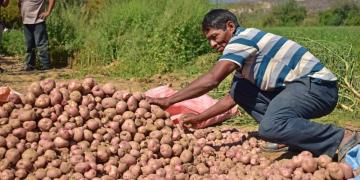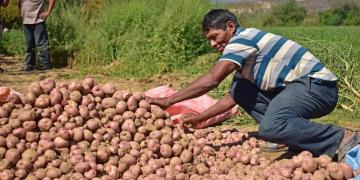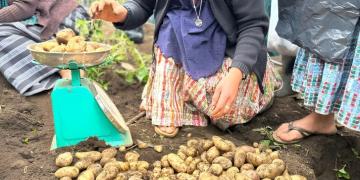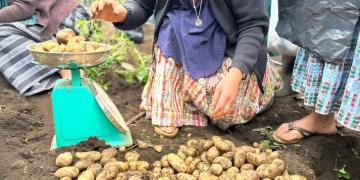Spain: Aragon boosts recovery of potato production
Various initiatives aim to relaunch a product that once had 5,000 hectares and a harvest of 105,000 tons in this autonomous community.

The potato industry experienced its peak in Aragon in the 1990s, when it reached some 5,000 hectares under cultivation and a production exceeding 105,000 tons. It then plummeted to the current 600 hectares and a production of 1.5 million kilos. However, various initiatives have emerged, and its recovery is on the rise.
In the Teruel town of Torres de Albarracín, in the Montes Universales mountains at an altitude of 1,275 meters, the company Patatas Fernando produces between 300,000 and 350,000 kilos each year. It has a plant for sorting, washing, chopping, and vacuum-packing. The company was founded with the aim of adding value to the potatoes grown by the Martínez Alamán family on their own farms.
Brothers Pablo and Fernando Martínez and their uncle Nacho Alamán are the driving forces behind the project. Currently, the three partners and two other people work there, compared to seven before the pandemic.
From the beginning of the harvest until April, they distribute the produce obtained from their own farms. They have 4.5 hectares dedicated to potato cultivation, with an annual harvest of approximately 120,000 kilos. When their own production runs out, they purchase from a farmer in Valencia and a distributor in Madrid to guarantee year-round supply to their customers. They distribute their potatoes to restaurateurs, mainly in Teruel, Zaragoza, and the Valencian Community.
Likewise, the Maestrazgo region aims to enhance the value of potatoes grown in Teruel towns such as Fortanete, Cañada de Benatanduz, and Cantavieja.
Recovery
An example of the potato’s recovery is Cella (Teruel), which doubled its production last year. The cooperative’s 180 members reached 900 tons, which, adding the kilos from all local farmers, rose to 1,800 tons across the 20 hectares dedicated to the crop. This was stated by the president of the La Fuente de Cella Countryside Cooperative Society, Fernando Sánz, at the opening of the 23rd Potato Fair.
Their Agria potato brand combines several characteristics: it is preserved for six months, has a long shelf life, and has a yellowish flesh. Its texture, along with its sugar content, makes it ideal for any type of cooking due to its versatility.
Also unique is the Chía potato (Huesca), which holds the organic farming label and produces around 80 tons per season. Five growers make up the Chía Potato Producers Association, which has revived traditional techniques for many of the processes. The popular and well-attended Chía Potato Fair is held in early November.
Its cultivation has added value, as the users of the El Remós Social Integration Center are responsible for marketing the produce, which reaches large supermarkets and traditional stores in cities such as Huesca, Lérida, and Zaragoza.
This potato is planted at the foot of the Chía mountain range, in the Benasque Valley, at an altitude of 1,200 to 1,500 meters. The variety grown is the Kennebec, a potato that adapts well to the soil, temperatures, and rainfall of the area. It is a long-cycle potato and develops from planting in May until harvest in October.
The cultivation of this tuber is making a comeback in Aragon, and a clear example is Ángel Bonel Melero, from Vera del Moncayo (Zaragoza), who was recognized as Young Potato Producer of the Year at the 2nd National Potato Awards, organized by Campo Magazine and presented in Medina del Campo (Valladolid). The award was given for his innovative and sustainable career in this crop, which combines advanced technology with responsible practices.
This young agricultural engineer has been working with his brother Juan Carlos since 2012 on a 189-hectare family farm, where he has implemented advances such as a soil screening system and an autonomous machine that selects potatoes in the field using optical technology.
Ángel Bonel points out that "the award is a recognition of my brother’s and my career. We are the fourth generation of potato growers, and we have always been committed to innovation, not only in machinery, but also in crop protection and the development of new varieties."
He adds that "it is essential to always be at the forefront of innovation, without forgetting the importance of caring for the environment. It’s not just about producing, but about doing so with quality, so that we can meet market needs and ensure the sustainability of our farms in all their aspects." In 2024, Ángel Bonel adopted sustainable agricultural practices that have allowed it to reduce its carbon footprint by 30%, thanks to the use of organic fertilizers and advanced algorithms for disease control. An approach that not only ensures the profitability of its crop but also contributes to environmental protection, consolidating its position as a benchmark in the Spanish potato sector.
Potatoes from Aragon
The family business Patatas Gómez, a national leader in the sector, has played a key role in the effort to revive potato cultivation in Aragon. The company works with farmers from various parts of Spain and, in Aragon, with a group that cultivates approximately 100 hectares of the Agria variety, which they market under the Potatico brand.
Constantly growing and expanding, Patatas Gómez has around 150 employees and last year packaged 100,000 tons, which it distributed throughout Spain and other European countries.
The company was founded in 1963 with the opening of a retail store, which was later supplemented by a small wholesale warehouse. It currently has four different warehouses.
Fuente: valenciafruits.com




